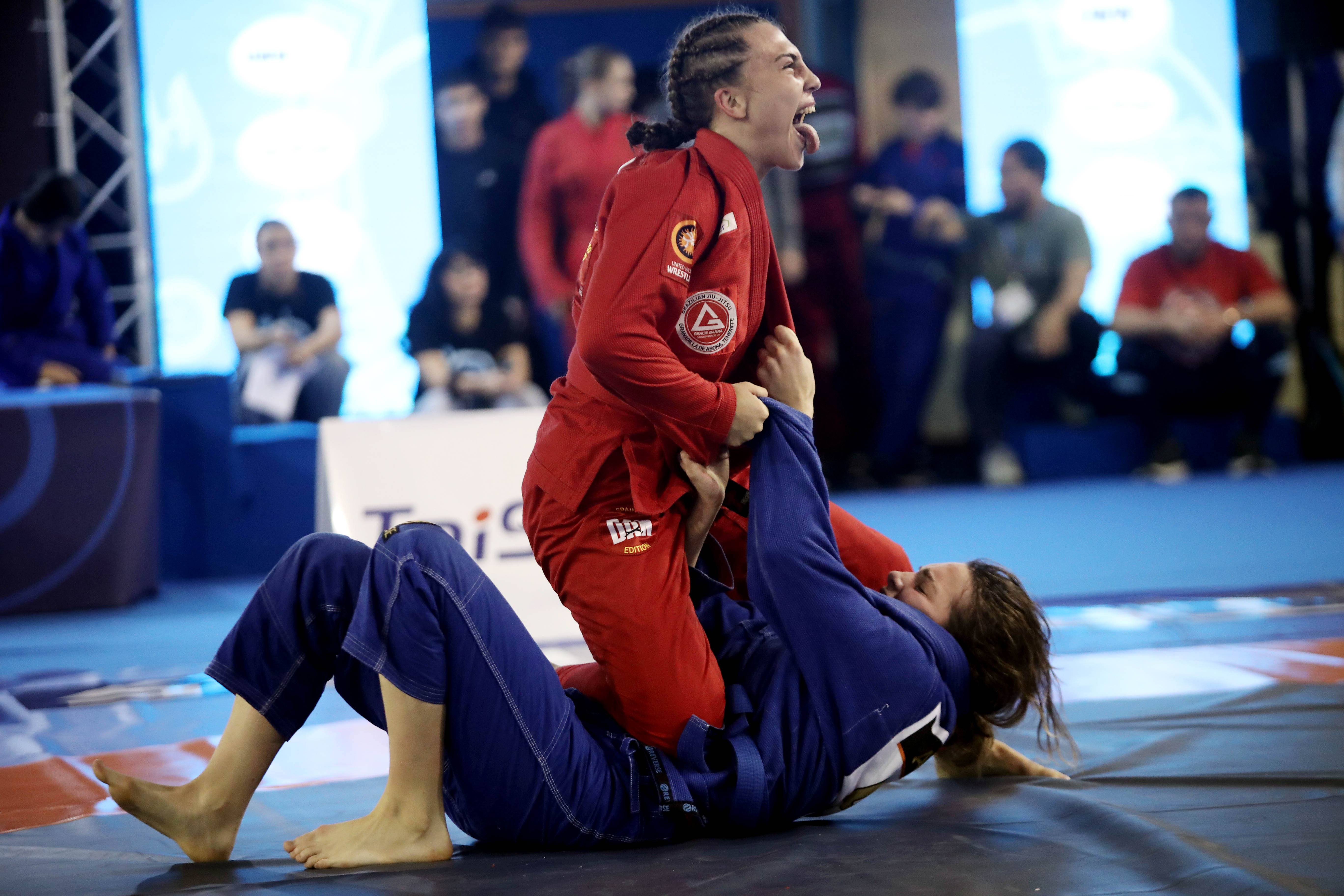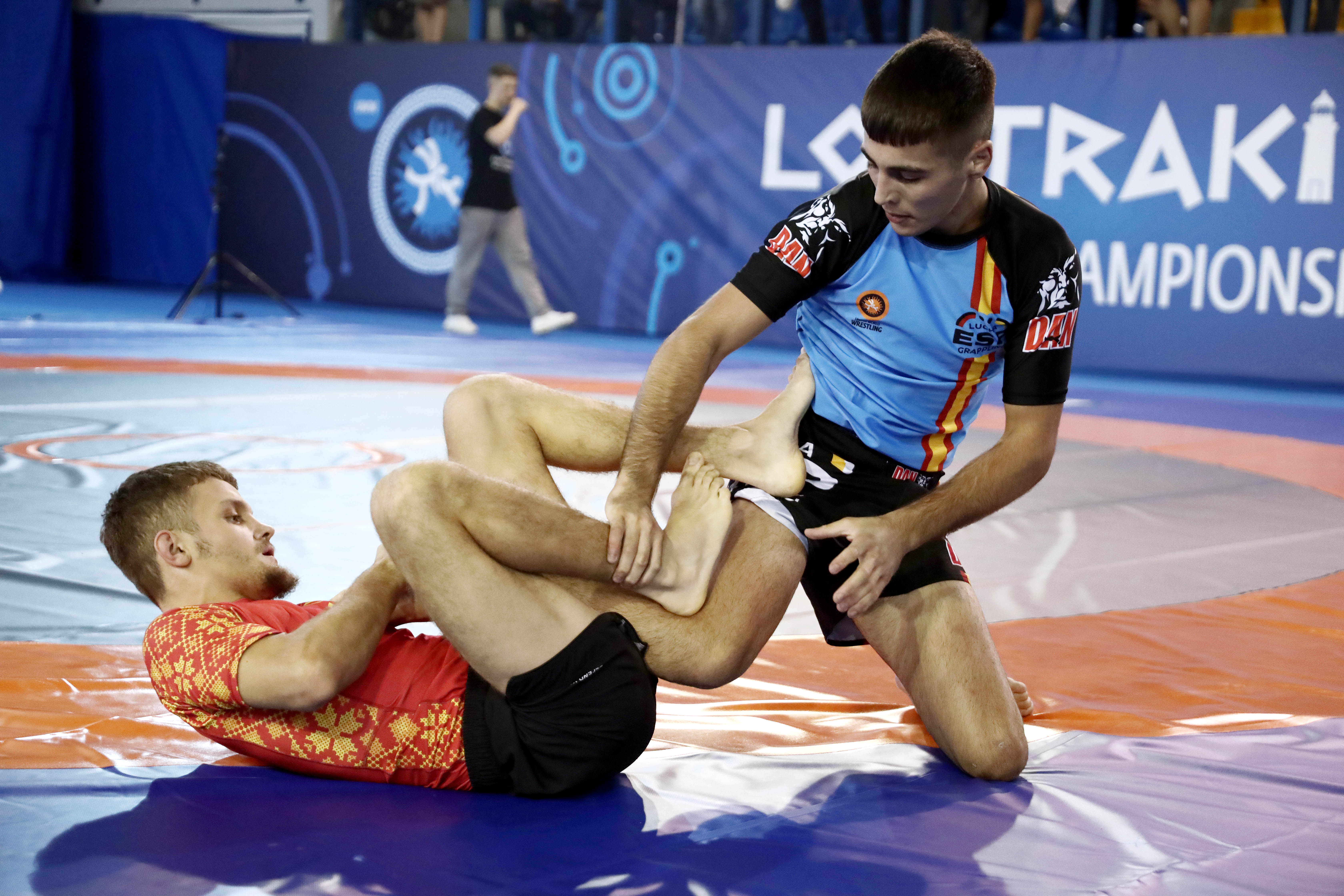LOUTRAKI, Greece (November 5) -- Two weeks after winning gold at the senior World Grappling Championships, Daria BRZOZOWSKA (POL) was at it again as she captured gold in U20 World Grappling Championships.
Brzozowska, who led an inspiring performance from Poland, won gold in Grappling No-Gi competition and silver in Grappling Gi.
In the three bouts she wrestled, Brzozowska managed to dominated her opponents and capture the gold medal. In the final, she defeated Alisa GOLUB (UWW), 6-1, in a one-sided bout.
Her gold in Grappling No-Gi, one of the three that Poland won in Loutraki, held the country edge out Spain to finish first in the team race. Spain and Poland finished with 75 points each but the latter had three golds while Spain had none.
In Grappling Gi, Spain got the top spot with 85 points while Poland was second with 50 points.
Apart from Brzozowska, the two other gold medalists for Poland were Adrianna MAZUR (POL) and Maja SALAMON (POL) who won gold medals at 64kg and 71kg respectively.
At 49kg, Alsu GALIEVA (UWW) won the Nelson bracket to claim gold while Arina LISTOPAD (UWW) did the same at 53kg to become the world champion.
Galieva, Mazur and Salamon repeated as champions in Grappling Gi while the 53kg gold medal went to Yurima BETANCOR (ESP) who defeated Paula MARTINEZ KIM (ESP), via submission.
 Angelica NIETO SANTOS (ESP) won the gold medal at 58kg. (Photo: United World Wrestling)
Angelica NIETO SANTOS (ESP) won the gold medal at 58kg. (Photo: United World Wrestling)
At 58kg, Angelica NIETO SANTOS (ESP) defeated Varvara MARTYNOVA (UWW), 9-0, in the final to give Spain a second gold which helped it win the team title.
Spain was dominant in the men's Grappling Gi as well, claiming the team title with 91 points, a one-point advantage over Poland which managed 90 points. Kazakhstan was third with 84 points.
For Spain, Jose MARTIN SANCHEZ (ESP) and Ouassim ADREUACH IDRISSI (ESP) won gold medals at 62kg and 77kg.
Last year's U17 world champion Martin Sanchez held on to his 6-4 lead against Aindi IUSUPOV (UWW) to win a thrilling 62kg final and the gold medal. Idrissi was more dominant in the 77kg final as he submitted Ikram YERSAIYN (KAZ).
Kazakhstan's gold medal came through Akhmet IBRASHEV (KAZ) who submitted Evgenii PARAKHIN (UWW) in the 58kg final.
Poland won two gold medals as well with Leon KURCZYNSKI (POL) defeating Rodrigo BLANCO TERAN (ESP), 7-2, in the 100kg final, denying Spain another gold medal.
Patryk REKMAN (POL) denied hosts Greece a gold medal after he managed to submit Angelos ZANGELIDIS (GRE) after building a 12-3 lead in the 92kg final.
The remaining four gold medals went to UWW grapplers with Magomed IUSUPOV (UWW) winning at 66kg, Amir APPAEV (UWW) at 71kg, Shamil GUSEINOV (UWW) at 84kg and Lavrent OGANESIAN (UWW) claiming the gold at 130kg.
 Jose MARTIN SANCHEZ (ESP) became a double world champion. (Photo: United World Wrestling)
Jose MARTIN SANCHEZ (ESP) became a double world champion. (Photo: United World Wrestling)
In Grappling No-Gi, Ukraine outclassed Spain to win the team title with 99 points while Spain finished with 94 points. Poland was third with 90 points.
Ukraine's lone gold medal came at 84kg as Lev TSEMKO (UKR) managed to hang on to a 6-3 win over Mateusz HEBDOWSKI (POL) in the final to claim the top medal.
At 58kg, Leonid IUSUPOV (UWW) denied Ibrashev a second gold medal of the tournament after beating him 2-0 in a low scoring final.
Martin Sanchez repeated as champion at 62kg as he defeated Nikita LADYGIN (UWW), 10-2, in the final to claim his second gold medal, all at the age of 18 years. Rekman also repeated as champion after he submitted Oleh STRATIICHUK (UKR) in the 92kg final to give Poland a gold medal.
At 71kg, Mohamed YAHYAOUI (FRA) went on to claim the gold medal after beating Arslan ZHASSULAN (KAZ), 9-2, in a one-sided final.
Among UWW grapplers, Dzhamaludin MUKHAMMADBASIROV (UWW) won gold medal at 71kg, while Rustam GADZHIMURADOV (UWW) defeated Umar EMINOV (UWW), 3-2, in the 77kg final.
Leon KURCZYNSKI (POL) was denied a double gold medal as well after he lost the 100kg final, 9-0, against Rodrigo BLANCO TERAN (ESP). At 130kg, Nikita BABAEV (UWW) won the Nelson bracket to claim the gold medal.
RESULTS
U20 Men's Grappling Gi
58kg
GOLD: Akhmet IBRASHEV (KAZ) df. Evgenii PARAKHIN (UWW), via submission
BRONZE: Saulo HERNANDEZ MONTERO (ESP) df. Ali ZHAMALIDEN (KAZ), 6-2
BRONZE: Fernando CABRERA GUTIERREZ (ESP) df. Rayan BENESSALAH (FRA), 3-2
62kg
GOLD: Jose MARTIN SANCHEZ (ESP) df. Aindi IUSUPOV (UWW), 6-4
BRONZE: Dmytro PRUT (UKR) df. Adam BENESSALAH (FRA), 4-4
BRONZE: Konstantinos GRAMMENOS (GRE) df. Daniel GONZALEZ (ESP), 15-4
66kg
GOLD: Magomed IUSUPOV (UWW) df. Mikhail TUKOV (UWW), via submission (4-2)
BRONZE: Ali MUKHAMBET (KAZ) df. Bakytbek MIRZABOEV (KGZ), 1-1 (overtime)
BRONZE: Alpamys USSABAYEV (KAZ) df. Gagik SAHAKYAN (ARM), 4-3
71kg
GOLD: Amir APPAEV (UWW) df. Yanis YAHYAOUI (FRA), via submission (1-0)
BRONZE: Laszlo STAGEL (HUN) df. Maksym TORCHYLO (UKR), 9-0
BRONZE: Milan LUKASZ (HUN) df. Arslan ZHASSULAN (KAZ), 2-2
77kg
GOLD: Ouassim ADREUACH IDRISSI (ESP) df. Ikram YERSAIYN (KAZ), via submission (2-0)
BRONZE: Rayane ANGELOSANTO (FRA) df. Gyorgy STAGEL (HUN), 6-3
BRONZE: Antonio HERRERA (ESP) df. Jakub KAMINSKI (POL), 6-2
84kg
GOLD: Shamil GUSEINOV (UWW) df. Ivan SHKABRII (UKR), 2-1
BRONZE: Csaba SZABO (HUN) df. Magomed ZAKRIEV (UWW), 13-2
BRONZE: Lev TSEMKO (UKR) df. Mateusz HEBDOWSKI (POL), 4-1
92kg
GOLD: Patryk REKMAN (POL) df. Angelos ZANGELIDIS (GRE), via submission (12-3)
BRONZE: Arsenii ERMAKOV (UWW) df. Yestemir KENZHEGALI (KAZ), via submission
BRONZE: Karim ADEM (FRA) df. Bator MOLNAR (HUN), 11-4
100kg
GOLD: Leon KURCZYNSKI (POL) df. Rodrigo BLANCO TERAN (ESP), 7-2
130kg
GOLD: Lavrent OGANESIAN (UWW) df. Nikodem KOWAL (POL), 6-1
U20 Women's Grappling Gi
49kg
GOLD: Alsu GALIEVA (UWW)
SILVER: Julia BELTRAN MARUENDA (ESP)
BRONZE: Adriana MARTINEZ KIM (ESP)
53kg
GOLD: Yurima BETANCOR (ESP) df. Paula MARTINEZ KIM (ESP), via submission (0-2)
58kg
GOLD: Angelica NIETO SANTOS (ESP) df. Varvara MARTYNOVA (UWW), 9-0
BRONZE: Alisa GOLUB (UWW) df. Iris GARCIA (ESP), via submission (2-2)
64kg
GOLD: Adrianna MAZUR (POL)
SILVER: Daria BRZOZOWSKA (POL)
BRONZE: Anabel PEREZ SCHMIELEWSKI (ESP)
71kg
GOLD: Maja SALAMON (POL)
SILVER: Sofiia ZHENEVSKA (UKR)
BRONZE: Zhasmin KAIRAT (KAZ)
U20 Men's Grappling No-Gi
58kg
GOLD: Leonid IUSUPOV (UWW) df. Akhmet IBRASHEV (KAZ), 2-0
BRONZE: Saulo HERNANDEZ MONTERO (ESP) df. Askhab GAISAEV (UWW), 5-2
BRONZE: Sargis VIRABYAN (ARM) df. Zalan KEKESI (HUN), 3-0
62kg
GOLD: Jose MARTIN SANCHEZ (ESP) df. Nikita LADYGIN (UWW), 10-2
BRONZE: Andrii TSVYK (UKR) df. Levente VARKONDI (HUN), 6-2
BRONZE: Aindi IUSUPOV (UWW) df. Daniel GONZALEZ (ESP), via submission (9-2)
66kg
GOLD: Dzhamaludin MUKHAMMADBASIROV (UWW) df. Moussa DIOUMASSI (FRA), 15-0
BRONZE: Ali MUKHAMBET (KAZ) df. Gagik SAHAKYAN (ARM), 4-2
BRONZE: Vadym SIROSHTAN (UKR) df. Bakytbek MIRZABOEV (KGZ), via submission (9-7)
71kg
GOLD: Mohamed YAHYAOUI (FRA) df. Arslan ZHASSULAN (KAZ), 9-2
BRONZE: Bilel BOULAMA (FRA) df. Lucian BRAI (MDA), via submission
BRONZE: Milan LUKASZ (HUN) df. Alvaro MEDINA (ESP), 6-2
77kg
GOLD: Rustam GADZHIMURADOV (UWW) df. Umar EMINOV (UWW), 3-2
BRONZE: Rayane ANGELOSANTO (FRA) df. Maksymilian KUSZAK (POL), 7-2
BRONZE: Ouassim ADREUACH IDRISSI (ESP) df. Andrii SOFRONII (UKR), 5-4
84kg
GOLD: Lev TSEMKO (UKR) df. Mateusz HEBDOWSKI (POL), 6-3
BRONZE: Shamil GUSEINOV (UWW) df. Shynggyskhan ABDIROV (KAZ), via submission (7-0)
BRONZE: Ivan SHKABRII (UKR) df. Ilyas ABDULLAYEV (KAZ), 12-6
92kg
GOLD: Patryk REKMAN (POL) df. Oleh STRATIICHUK (UKR), via submission (8-1)
BRONZE: Christos SERMIAS (GRE) df. Ion SILI (MDA), via submission (5-0)
BRONZE: Karim ADEM (FRA) df. Yestemir KENZHEGALI (KAZ), 5-2
100kg
GOLD: Rodrigo BLANCO TERAN (ESP) df. Leon KURCZYNSKI (POL), 9-0
130kg
GOLD: Nikita BABAEV (UWW)
SILVER: Lavrent OGANESIAN (UWW)
BRONZE: Nikodem KOWAL (POL)
U20 Women's Grappling No-Gi
49kg
GOLD: Alsu GALIEVA (UWW)
SILVER: Julia BELTRAN MARUENDA (ESP)
BRONZE: Lyubov TEMNIKOVA (KAZ)
53kg
GOLD: Arina LISTOPAD (UWW)
SILVER: Paula MARTINEZ KIM (ESP)
BRONZE: Yurima BETANCOR (ESP)
58kg
GOLD: Daria BRZOZOWSKA (POL) df. Alisa GOLUB (UWW), 6-1
BRONZE: Angelica NIETO (ESP) df. Safiya UALIAKHMETOVA (KAZ), via submission (2-0)
BRONZE: Iris GARCIA (ESP) df. Maria BARNA (POL), via walkover
64kg
GOLD: Adrianna MAZUR (POL)
SILVER: Anabel PEREZ (ESP)
BRONZE: Kitti BALJER (HUN)
71kg
GOLD: Maja SALAMON (POL)
SILVER: Sofiia ZHENEVSKA (UKR)
BRONZE: Zhasmin KAIRAT (KAZ)




 Angelica NIETO SANTOS (ESP) won the gold medal at 58kg. (Photo: United World Wrestling)
Angelica NIETO SANTOS (ESP) won the gold medal at 58kg. (Photo: United World Wrestling) Jose MARTIN SANCHEZ (ESP) became a double world champion. (Photo: United World Wrestling)
Jose MARTIN SANCHEZ (ESP) became a double world champion. (Photo: United World Wrestling)
Share your thoughts.
Comments